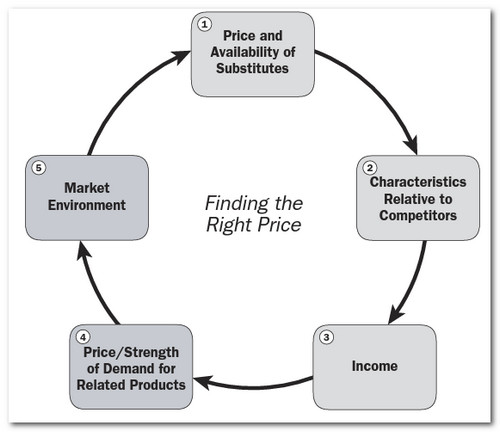
Ever wondered how to price your SEO services? Your products? Have you set your prices at a point where you can get the best possible returns?
Pricing seems simple, but there's a bit of an art to getting it right.
In this article we'll take a look at different ways to price, a few strategies to use, and why you might want to avoid charging everyone the same price.
Why Pricing Strategy Matters
Obviously, if we get our pricing wrong, we'll miss out on business.
In order to increase profits, we could devise new services and products. However, by adjusting our existing pricing strategy on goods or services we already provide, we can squeeze out extra revenue with little effort.
To get greater returns from pricing, companies typically find ways to charge different prices to different customers.
Cost Plus Pricing
Cost-plus pricing is a common pricing method. Pricing of a good or service is determined by working out the total production cost, then add a profit margin. There's nothing wrong with this method - cost-plus pricing is widely used - however it does present a few problems.
One problem is that cost-plus pricing doesn't take into account the role of competitors. If we offer a SEO service at $15,000, arrived at by the cost-plus method, but our competitors offer the same service for $10,000 then our pricing clearly won't work. We must price in accordance with the market.
Cost-plus pricing doesn't take into account fluctuating demand. If demand for your products/services suddenly goes through the roof - say because you've been interviewed on nationwide television - they become scarce, and price should rise to reflect this scarcity.
Another problem is that it doesn't take value, as perceived by the customer, into account.
Imagine that you've created a widget that enables a machine to work at twice the output it did before. The value to the customer is considerable, as they can now double their output with little extra investment. The total cost of building the widget may be low. Cost-plus pricing would typically underprice such a widget. Value based pricing would charge in line with the total value it creates for the customer i.e. the increased value of their output.
In terms of SEO, are you charging enough for your services if you charge a few thousand dollars, whilst your clients make millions? Thinking of pricing in terms of value provided to your customer is a key to increasing profits.
Let's look at a method to accurately calculate a price for your goods or services.
Pricing Calculator
In the The Art Of Pricing, you can find the following method for setting prices.

Step One: Price & Availability Of Substitutes
Are there any substitutes for your product?
If so, how are they priced?
Step 2: Characteristics Relative to Competitors
What features do you offer that your competitors do not, and vice versa?
Do you customers value these features enough to pay extra for them?
Do customers value other characteristics, such as brand, established service levels, reputation, locality etc?
Step 3: Income
Can your customers afford your prices?
Are they less able to afford your prices than they once were?
Are there times of the year they can afford it, and other times where their purchasing power is constrained?
Step 4. Price/Strength Of Demand For Related Products
What are the associated overheads of owning your product? For example, if you sold cars, there are other costs involved that make up the total cost of ownership, including running costs, insurance and maintenance.
Step 5 - Market Environment
Has your product suddenly become high profile?
Has demand increased/decreased considerably in a short period of time?
This type of approach takes into account a number of variables when setting price, namely affordability, value, market conditions, and competition.
Some Issues With Value Pricing
Pricing, without taking into account overall business strategy, is a mistake.
For example, say there is a natural disaster where people lose their homes. A hotel may jack up the rates to ridiculous levels because it knows demand will surge, however the long-term value of the brand may be damaged if the hotel gets a reputation for price gouging.
Some companies may want to price at a level that gains them clients, but not revenue. For example, in order to build a reputation in the market, new SEO agencies sometimes provide services at a discount, or free, in order to get a few big name clients on their books.
Pricing Tricks
Let's take a look at a few common pricing methods in practical terms.
The Law Of Three: If you go into a shop to buy a washing machine, you'll likely be faced with a range of models. Nothing odd about this, of course. The shop is trying to cover all bases.
However, there is often something more subtle going on. Most people will buy middle of the range. The middle of the range feels "safest". So, a shop will often have a ludicrously expensive model, and a very cheap model. The actual model they want to sell you is the priced in the middle of those two extremes. If the shop didn't offer a ridiculously expensive model as a basis for comparison, the middle option becomes the expensive option, and you're more likely to set your sights lower.
When you offer SEO services, try doing the same. Offer a bells and whilstles version that is highly priced, a mid option, and a cheap option. Typically, your customers will select the middle option. If you only offer two options, people typically choose the cheapest.
Auctions: Perhaps not applicable to SEO, but if you're selling products, the auction system can be a great way to achieve better prices. Entire books have been written about the psychological effects of auctions, but it all boils down to the fact that people place different values on products based on their own needs. Those who want the product the most, pay the most.
Versioning - Offer slightly different versions of the same thing. See Apple and their iPad pricing. The cost of production of each model is probably near identical across the range, but by offering different versions, they can figure out who is prepared to pay more.
Versioning can often be more extreme when setting a wide price range. Conferences tend to offer coupons off retail price for early attendees, but so long as the full price has been seen publicly by some folks, this lends a perception of value that can be used in subsequent marketing & packaging. Some companies might run an in-person conference which charges thousands of dollars, and then afterwards, sell you a download version of it for a few hundred dollars, all the while anchoring on the "fact" that you just saved $1,000+ with your purchase. The "crucial" networking & intimacy benefits which were used to promote the in-person event soon disappear and the concepts of value and convenience (instant download, no travel required, etc.) are brought to the fore.
Segmented Pricing - Perhaps your buyers can't pay the entire cost up front, but they can buy using other arrangements, like a monthly fee. Some clients might prefer bundle offers where everything is done for them, whilst others want to mix and match parts of your service. Offer different options so your client can fit their budget to your offering.
Differential Pricing - Offering coupons can grab those buyers who are very price sensitive, or looking to buy only if they perceive a genuine bargain. Your other customers won't bother with coupons, so you can successfully run two different pricing strategies, one discount and one full price, by using coupons.
Markdowns - Obvious, but powerful. You advertise the usual price, but a line through it, and offer it at a reduced price. What's not so obvious is when markdowns should be used. Markdowns don't work so well on luxury items, as this can compromise their exclusivity value. Not much point owning a high-end garment is everyone has one.
Notice that luxury items either don't display their price, or, if they do, it's typically stated in rounded figures i.e. $1500. Budget items price in dollars and cents i.e. $39.95 or slightly under the next increment i.e. $99 as opposed to $100. The format of the price signals exclusivity, or lack thereof.
But Is This Fair?
Offering one price to one group, and another price to others may seem unfair. This is something you'll need to weigh up for yourself.
However, keep in mind that if the differing price points reflect different levels of value, then the customer is deciding what they value most. If they want the full service, they should expect to pay full-service prices. If they want the lowest price, they may be prepared to wait or sacrifice some features. The customer decides what they value, and votes with their cash.
And they can always say "no" :)


